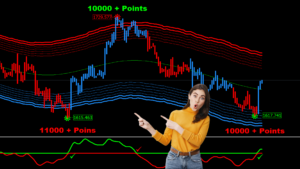Fundamental news trading refers to a trading strategy in the financial markets where traders make decisions based on the release of important economic or financial news events. These news events can include economic indicators, central bank announcements, geopolitical developments, corporate earnings reports, and more.
The basic idea behind fundamental news trading is to anticipate how these news events might impact the financial markets and then take positions accordingly. For example, if a country releases positive employment data, it might suggest a strong economy, potentially leading to a rise in the country’s currency value and stock market. Traders who anticipate this outcome might go long on the currency or the stock market beforehand.
Similarly, if a company reports lower-than-expected earnings, its stock price might drop, and traders might consider shorting the stock or taking other bearish positions.
However, fundamental news trading can be risky due to the volatility and unpredictability of market reactions to news events. Sometimes, the markets might already have priced in the news, leading to a “buy the rumor, sell the news” scenario where prices move in the opposite direction of what might be expected. Additionally, rapid market movements around news releases can also trigger slippage and increased spreads, making execution more challenging.
Traders who engage in fundamental news trading often need to have a strong understanding of the specific news events they’re trading, as well as the broader economic and geopolitical factors that can influence market behavior. It’s also important to have a well-defined risk management strategy and to be aware of the potential for sudden and unpredictable market movements.
As with any trading strategy, it’s recommended that individuals thoroughly research and educate themselves before attempting fundamental news trading and consider practicing with a demo account before using real money.
Fundamental News Trading Feature
Fundamental news trading is a trading approach that focuses on trading decisions based on the release of important economic, financial, or geopolitical news events. This strategy can be employed in various financial markets, including forex (foreign exchange), stocks, commodities, and more. Here are some key features and considerations of fundamental news trading:
- News Events: Traders closely monitor scheduled economic indicators, central bank announcements, corporate earnings reports, political developments, and other significant news releases that can impact the markets.
- Market Reactions: Traders analyze how the market is likely to react to different news outcomes. Positive news might lead to bullish market sentiment, while negative news can result in bearish sentiment.
- Volatility: News events often lead to increased market volatility as traders rapidly adjust their positions based on new information. This can create both trading opportunities and risks.
- Price Spikes: Rapid price movements can occur around news releases, leading to price spikes and potentially causing slippage or execution challenges.
- Risk Management: Due to the volatility associated with news events, risk management is crucial. Traders need to determine appropriate position sizes and set stop-loss orders to limit potential losses.
- Timing: Timing is critical in fundamental news trading. Traders need to be quick to react to news releases and execute trades before the market sentiment shifts.
- Preparation: Traders often create a trading plan in advance, outlining potential scenarios and strategies for different news outcomes. This preparation helps them make more informed decisions under pressure.
- Calendar Awareness: Traders use economic calendars to track upcoming news releases and events, which helps them anticipate market movements.
- Fundamental Analysis: Traders engage in fundamental analysis to understand the underlying factors that might influence market reactions to news events. This includes studying economic indicators, central bank policies, and geopolitical trends.
- News Sources: Traders rely on reputable news sources to access accurate and timely information. News feeds, financial news websites, and official government publications are commonly used sources.
- Backtesting: Some traders may use historical data to backtest their strategies against past news events to evaluate their potential effectiveness.
- Educational Resources: Fundamental news trading requires a solid understanding of economics, financial markets, and news analysis. Traders often seek educational resources to enhance their knowledge.
It’s important to note that while fundamental news trading can offer profitable opportunities, it also comes with risks. Markets may not always react as expected, and sudden reversals or unexpected market reactions can lead to losses. Traders need to have a disciplined approach, adapt quickly to changing market conditions, and be aware of the inherent challenges associated with this strategy.
















